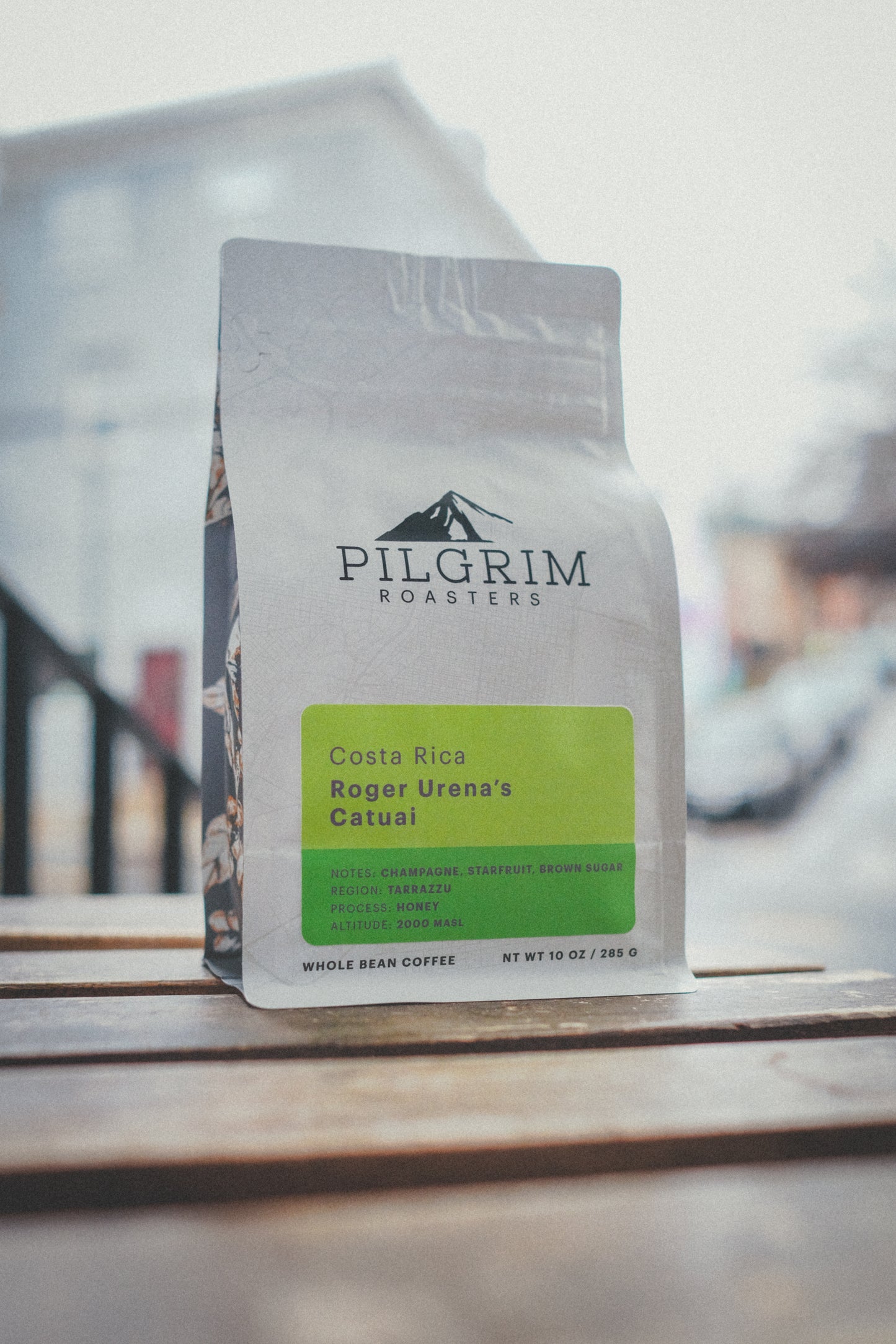Roger Ureña's Catuai 🇨🇷
Roger Ureña's Catuai 🇨🇷
White Honey - Costa Rica
If you’ve been to our cafe before, it’s likely you’ve already tasted Roger Ureña’s exceptional Catuai. Since opening in 2017, Roger’s coffee has been a staple in our cafe and we’re certain to have a varietal (or two or three) from his farm Santa Teresa 2000 when in season. The Catuai was the first coffee we ever tried from Roger, giving it a special place in our cafe.
This delicate, yet sweet, honey processed Catuai sparkles like champagne and is a long time barista favorite.
Origin
Origin
Santa Teresa 2000, San José, Tarrazú, Costa Rica (1800-2050masl)
Variety & Processing
Variety & Processing
Variety
- Catuaí
Processing Method
- Rested in cherry from evening to morning after harvest
- Mechanically pulped to remove 90% mucilage
- Sun-dried on raised beds or patios in greenhouse for 8-15 days until 10-10.5% moisture content is achieved
Flavor Profile
Flavor Profile
- Champagne
- Starfruit
- Brown Sugar
Couldn't load pickup availability
Share




Producer Information
Producer
Sourced by Selva Specialty Coffee
Roger Ureña has been involved in coffee farming since he was a young boy. Both his parents and grandparents were coffee farmers and taught him how to work the land. In his own words, he believes that growing coffee in Tarrazu is a very common activity which has been shared from family to family for years, because it is a good source of income and family growth.
Since Roger was little he was expected to work; helping his father in the dairy and coffee farming activities. At the same time he fulfilled his studies and finished high school. Still, at the age of 15 he started working in coffee by himself, starting with a coffee nursery, and later on started to grow his first coffee plantation.
In 1987 Roger went to work in the United States in order to save money. This way he could invest in his business back home, which he needed for growing his coffee plantations. Yet, it was not until years ago that he decided to process his own cherries at Santa Teresa micro-mill because the prices the cooperative was offering him were no longer sustainable.
The main farm, Santa Teresa, where the mill is located was acquired by Roger 10 years ago. Its altitude goes from 1900 masl to 2050 masl. It has a total of 60 hectares, but the area where coffee is planted is just 10 hectares. Most of the land remains protected forest. Roger strategically chose a great parcel of his land to build his processing plant. It faces the gentle afternoon sun and is situated on a slope that clouds tend to move away from quickly. In this farm he decided to install a Penagos pulping machine, raised beds inside of a greenhouse, concrete patios, mechanical dryers, and a warehouse. A complete operation.
He decided early on to plant different varieties since he realized that there weren’t many farmers planting different coffees other than Catuai and Caturra in Costa Rica at the time. Knowing the impact variety has in the cup; he thought there is definitely a market for more exotic and different varieties. Therefore he has been growing different varieties like: Rume Sudan, Ethiopian varieties, Pacamara, Villalobos, Bourbon, Geisha, SL-28, Typica Mejorado, as well as Catuai.
Roger keeps innovating and two years ago he remodeled one of the oldest houses in his community to be a beautiful coffee shop. The idea is to incentivize local consumption of good quality coffee much of which is coming from his farm in Dota Valley and for people that visit the Tarrazu region to notice its standards.
El Cedral is a 20 hectare farm, but only 14 hectares are planted with coffee, this farm is located at 1800 masl about 3 kilometers from Roger’s micro mill, here he grows Catuai and it has banana and other fruit trees as shade, the shade is very important to keep the plants healthy and to give organic material to the soil. Also in this farm we find a waterfall, the water comes from a natural spring and it’s beautiful, not only provides good and fresh water to the farm but also makes the farm more attractive to visit.
Roger and his son, Jose, usually bring the cherries to the mill in the evening. They leave the cherries in a container overnight and process the coffee first thing the next morning. They believe this helps the results in the cup and gives more complexity and sweetness to it. The coffee is mechanically pulped in a Penagos eco pulper which removes approximately 90% of the mucilage.
The beans are sun-dried on raised beds or patios protected by the greenhouse. Most of his coffees are processed as white honey. This type of process takes around 8-15 days to dry and get to the right moisture content (10%-10.5%). Two years ago Roger built a greenhouse for the patios which is better protecting the parchment when drying. It’s been challenging, however, to have this green house because it was an expensive investment and it’s very windy at high altitude. Roger hopes that the wind won’t destroy the green house in the near future.
Shipping & Fulfillment
All online orders will be packaged and shipped on Fridays
All coffee is shipped as close to roast date as possible, however we find our coffees taste best 3-6 weeks off roast.




